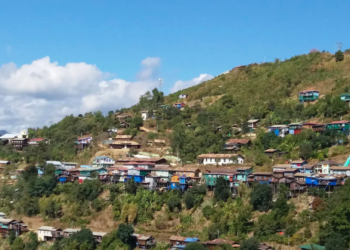“We have never bullied, oppressed, or subjugated the people of any other country, and we never will.”
So said Chinese President Xi Jinping in his address to mark the 100th anniversary of the founding of the Chinese Communist Party on July 1 in Beijing’s Tiananmen Square.
Many Myanmar citizens were upset when the Chinese Embassy in Yangon posted the Burmese translation of Xi’s words on its Facebook page the following day.
Myanmar was completely under military rule from 1962 to 2010, and experienced another coup in February this year. But Beijing has never condemned the coups. Instead it has backed the repressive military regimes whenever they were threatened at the United Nations. Xi seems to ignore the fact that supporting repressive regimes in Myanmar amounts to indirectly bullying its people.
Beijing was only too willing to help the junta leaders out whenever Western countries imposed sanctions against the military regime led by dictator Than Shwe after 1988. China together with Russia spoke for Myanmar whenever other countries announced measures to punish the junta leaders. And the two have also lent Min Aung Hlaing a helping hand after he followed in the footsteps of his predecessors.
Under U Thein Sein’s quasi-civilian government in 2012, President’s Office Minister U Aung Min admitted that “we are afraid of China” during a public meeting in Monywa, Sagaing Region with local people who were protesting the controversial Chinese-backed Letpadaung copper mining project.
Beijing, however, does not protect military regimes for free. It has had a lot of control over Myanmar under military rule, and it is Myanmar’s people who have suffered the consequences.
To name a few examples, Myanmar has come very close to losing Myitsone, the confluence of the Mali and N’mai rivers in Kachin State that forms the source of the Ayeyarwady River. In this location, China plans to build a mega hydropower project. The project was suspended in 2011 but has never been terminated. Mt. Letpadaung has gone. And forested areas in northern Myanmar have significantly shrunk thanks to China.
China has earned interest on its investment in supporting military regimes in Myanmar, but there have also been costs. Anti-Chinese sentiment is steadily increasing in its neighbor.
In the days following the military’s takeover in February, Myanmar people gathered daily outside the Chinese Embassy in Yangon, well aware that China’s support for the regime would only perpetuate their suffering. Protesters called on China to condemn the coup and not to support the regime. But their calls fell on deaf ears. This explains the rising anti-Chinese sentiment in Myanmar.
This has led to campaigns calling for a boycott of Chinese products. Three policemen providing security for Sino-Myanmar gas pipelines in Mandalay’s Singaing were killed after the February coup. And Chinese-run factories in Yangon’s Hlaing Tharyar and Shwepyithar townships were set on fire in March when junta forces imposed brutal crackdowns on anti-regime protesters there. (It remains unclear which side was responsible for the arson attacks. Anti-regime protesters denied torching the factories.)
In the distant past, the first invasion from what is now China occurred when the Mongols invaded Myanmar in 1283, during the reign of King Narathihapate in the Bagan Dynasty. King Narathipate was forced to flee, causing him to go down in Myanmar’s history as “Tayoke Pyay Min” (the King who fled from the Chinese).
Chinese armies attempted to invade Myanmar four more times between 1765 and 1769, during the reign of King Sinbyushin in the Konbaung Dynasty.
In the 1950s, two years after Myanmar regained independence in 1948, forces of the Chinese Nationalist Party, or Kuomintang, invaded Myanmar, forcing the government to complain to the UN.
And Myanmar’s civil war has been stoked by interest-seeking Chinese governments playing Myanmar governments, the Communist Party of Burma and ethnic armed revolutionary groups off one another.
Today, Beijing is backing the military regime, which has killed nearly 900 civilians and detained thousands of pro-democracy activists. So, it is left to the reader to determine whether Xi’s statement is true.
You may also like these stories:
Tabayin Villagers Cannot Count Dead Amid Myanmar Junta Attacks
Myanmar Junta Suspends Trials Inside Insein Prison Due to COVID-19
UN Vote Puts Spotlight on Myanmar-Belarus Connection

















